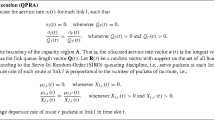Abstract
We consider several scheduling problems for packet based systems with time-varying channel conditions. Designing scheduling mechanisms that take advantage of time-varying channel conditions, which are different for different users, is necessary to improve system performance; however this has to be done in a way that provides some level of fairness among the users. Such scheduling mechanisms are termed opportunistic. We generalize the opportunistic scheduling mechanisms in the literature on three fronts. First, we formulate and solve an opportunistic scheduling problem with multiple general long term QoS constraints and a general system objective function. The solution of this opportunistic scheduling problem is an index policy. Then, we generalize this problem to include multiple interface systems in which several users can be served simultaneously. Apart from the long term QoS constraints specified by each user, multiple interface systems are constrained with other physical limitations imposed by the system. We show that the structure of the optimal opportunistic scheduling policy is carried over to the problem with general constraints and multiple interfaces. We also study the stability of the multiple interface systems and propose a throughput optimal scheduling rule for such systems. We then formulate an opportunistic scheduling problem with short term processor sharing fairness constraints as an optimization problem where fairness is guaranteed over a finite time window. In its most general form, this problem cannot be solved analytically. Hence observing the form of the optimal policies for special cases, we propose a heuristic scheduling policy. We illustrate the effectiveness of the policies via simulation.
Similar content being viewed by others
References
M. Andrews, K. Kumaran, K. Ramanan, A. Stolyar, R. Vijaykumar and P. Whiting, CDMA data QoS scheduling on the forward link with variable channel conditions, Technical report, Bell Laboratories, Lucent Technologies (2000).
M. Armony, Queuing Networks with Interacting Network Resources. PhD thesis, Stanford University, 1999.
P. Bender, P. Black, M. Grob, R. Padovani, N. Sindhushayana and A. Viterbi, CDMA/HDR: A bandwidth-efficient high-speed wireless data service for nomadic users, IEEE Communication Magazine 38 (2000) 70–77.
M. Gurelli and R. Etkin, Capacity simulation of CDMA2000 1xEV-DO forward link with opportunistic beam forming, in: Proceedings of IEEE GLOBECOM, December 2003.
S.S. Kulkarni and C. Rosenberg, Opportunistic scheduling for wireless systems with multiple interfaces and multiple constraints, (September 2003) pp. 11–19.
sunilkulglobecom S.S. Kulkarni and C. Rosenberg, Opportunistic scheduling policies for wireless systems with short term fairness constraints, in: Proceedings of IEEE GLOBECOM (December 2003).
X. Liu, E.K.P. Chong and N.B. Shroff, A framework for opportunistic scheduling in wireless networks, Computer Networks 41(4) (2003) 451–474.
Y. Liu, S. Gruhl and E. Knightly, WCFQ: An opportunistic wireless scheduler with statistical fairness bounds, IEEE Transactions on Wireless Communication 2(5) (2003) 1017–1028.
Y. Liu and E. Knightly, Opportunistic fair scheduling over multiple wireless channels, in: Proceedings of IEEE INFOCOM, San Francisco, CA, USA (2003).
S. Lu, V. Bharghavan and R. Srikant, Fair scheduling in wireless packet networks, IEEE/ACM Transactions on Networking 7(4) (1999) 473–489.
M.J. Neely, E. Modiano and C.E. Rohrs, Power and server allocation in a multi-beam satellite with time varying channels, in: Proceedings of IEEE INFOCOM, New York, USA (2002).
T. Ng, I. Stoica and H. Zhang, Packet fair queuing algorithms for wireless networks with location dependent errors, in: Proceedings of IEEE INFOCOM, San Francisco, CA, USA (1998).
B. Sadeghi, V. Kanodia, A. Sabharwal and E. Knightly, Opportunistic media access for multirate Ad-Hoc networks, in: Proceedings of ACM MOBICOM (2002) pp. 24–35.
S. Shakkottai and A. Stolyar, Scheduling algorithms for a mixture of real-time and non-real-time data in HDR in 17th International Teletraffic Congress (2001).
P. Viswanath, D.N.C. Tse and V. Anantharam, Asymptotically optimal waterfilling in vector multiple access channels, IEEE Transactions on Information Theory 47(1) (2001) 241–267.
P. Viswanath, D.N.C. Tse and R. Laroria, Opportunistic beamforming using dumb antennas. IEEE Transactions on Information Theory 48(6) (2002) 1277–1294.
Author information
Authors and Affiliations
Corresponding author
Additional information
Sunil Suresh Kulkarni obtained his M.E. (1999) degree in Electrical Communication from Indian Institute of Science (IISc) Bangalore, and B.E. (1997) in Electronics Engineering from Walchand College of Engineering, Sangli. He is currently pursuing his Ph.D. in School of Electrical and Computer Engineering at Purdue University and also pursuing M.S in Department of Mathematics. Before joining for Ph.D program he worked as software engineer in India. His research interests include wireless cellular networks, ad-hoc and sensor networks and performance modelling of communication networks.
Catherine Rosenberg Born and educated in France (Ecole Nationale Supérieure des Téléxcommunications de Bretagne, Diplome d’Ingénieur in EE in 1983 and University of Paris, Orsay, Doctorat en Sciences in CS in 1986) and in the USA (UCLA, MS in CS in 1984), Dr. Rosenberg has worked in several countries including USA, UK, Canada, France and India. In particular, she worked for Nortel Networks in the UK, AT&T Bell Laboratories in the USA, Alcatel in France and taught at Ecole Polytechnique of Montreal (Canada).
Dr. Rosenberg is currently Professor in the School of Electrical and Computer Engineering at Purdue University. She is also the Director of the university-wide Center for Wireless Systems and Applications at Purdue University.
Agencies and industries that have supported her research include NSERC (The Canadian NSF), FCAR (The Quebec counterpart of NSERC), CRC (Canadian Ministry of Communications), EEC (European Commission), ESA (European Space Agency), France-Telecom, CISCO, and Nortel Networks.
Her research interests are in broadband networks (IP and ATM), in wireless networking, in network security, peer-to-peer networks, and in traffic engineering (QoS, Charging, Dynamic Provisioning, Network Design, and Routing). She has authored over 70 papers on ATM, satellite broadband networking, wireless networking, and traffic engineering and has filed several patents in the UK and the USA.
Rights and permissions
About this article
Cite this article
Kulkarni, S.S., Rosenberg, C. Opportunistic Scheduling: Generalizations to Include Multiple Constraints, Multiple Interfaces, and Short Term Fairness. Wireless Netw 11, 557–569 (2005). https://doi.org/10.1007/s11276-005-3512-y
Issue Date:
DOI: https://doi.org/10.1007/s11276-005-3512-y




